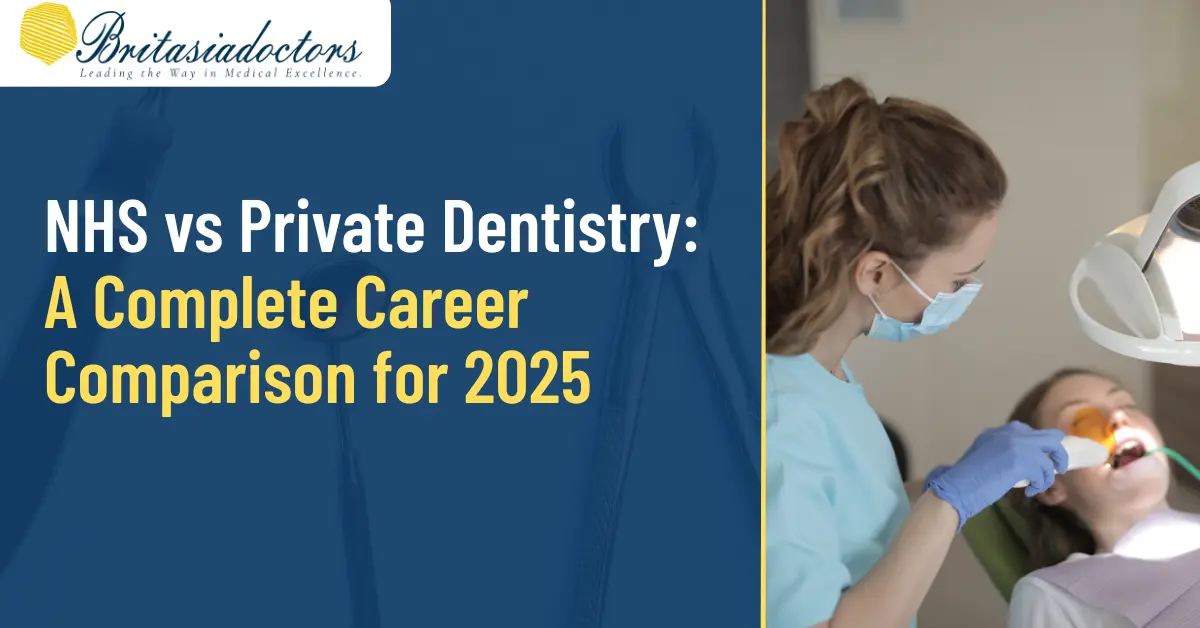
The dental profession in the UK offers diverse career pathways, with NHS and private practice representing the two main routes that dental professionals can choose. In 2025, this choice has become increasingly significant as the dental landscape continues to evolve amidst healthcare reforms, technological advancements, and shifting patient expectations. This comprehensive guide explores the key differences between careers in NHS dentistry and private practice, helping both newly qualified dentists and experienced professionals make informed decisions about their career trajectory.
Salary Differences: Understanding the Financial Landscape
NHS Dentistry Earnings
The NHS operates on a structured pay scale that provides predictable income progression:
-
Foundation dentists in their mandatory first year of NHS training earn approximately £38,472 as of 2025.
-
After completing foundation training, NHS dentists can expect to earn between £47,000 and £100,000 depending on experience and responsibilities.
-
Dental core trainees earn between £49,909 and £61,825.
-
NHS consultants in dental specialties can earn between £88,364 and £119,133 per year.
The NHS also offers additional benefits, including a generous pension scheme and paid leave that increases with service length, making it an attractive option for those valuing financial stability.
Private Dentistry Earnings
Private practice often offers higher earning potential:
-
Private dentists typically earn between £50,000 and £100,000, with the potential to earn significantly more.
-
Lead dentists in private practice can earn between £41,000 and £95,000, according to GlassDoor data.
-
Some private practitioners in high-demand areas or specialties can earn upwards of £130,000, with exceptional cases reaching £170,000-£200,000.
-
Specialists in areas such as oral surgery, orthodontics, and cosmetic dentistry often command premium rates.
Private practitioners also have the advantage of creating additional revenue streams through selling dental products, running training courses, or providing aesthetic services like Botox.
Job Stability and Security
NHS Career Stability
The NHS offers considerable job security, which is particularly valuable during economic downturns:
-
Guaranteed patient flow through the NHS referral system
-
Protection from market fluctuations
-
More predictable workload and income
-
Established career progression pathway
However, it’s worth noting that as of 2025, over 21% of NHS general dentist positions are unfilled, indicating systemic challenges within the service.
Private Practice Stability
Private practice stability depends more on:
-
Practice location and local market conditions
-
Marketing effectiveness and reputation management
-
Patient retention rates and referrals
-
Economic conditions affecting discretionary spending
While potentially less structurally secure than NHS positions, well-established private practices can offer strong stability, particularly those with loyal patient bases or in affluent areas with high demand for cosmetic and advanced treatments.
Work-Life Balance Considerations
NHS Work Environment
NHS dentistry presents a mixed picture for work-life balance:
-
Structured working hours and clearer boundaries
-
More administrative and regulatory requirements
-
Higher volume of patients, often with complex needs
-
Pressure to meet NHS targets and UDA (Units of Dental Activity) quotas
Many NHS dentists report challenges with bureaucracy and administrative burdens that affect their satisfaction:
“It’s stick after stick after stick after stick. And as a practice owner you go, “Why am I putting myself through all of this regulation when with one simple maneuver I can go, ‘I’m not playing this game anymore’?”
Private Practice Flexibility
Private practice often offers:
-
Greater control over scheduling and working hours
-
Ability to set appointment lengths based on treatment complexity
-
Opportunity to focus on quality rather than quantity of care
-
Reduced administrative burden compared to NHS dentistry
-
More flexibility for part-time work or tailored schedules
However, practice owners face additional business management responsibilities that can impact work-life balance.
Patient Demographics and Types of Care
NHS Patient Profile
NHS dentistry serves a diverse cross-section of the population:
-
Broader socioeconomic range of patients
-
Higher proportion of complex medical needs
-
Greater emphasis on essential and preventative care
-
Long-term patient relationships spanning generations
-
Patients with limited ability to pay for private treatment
Many NHS dentists value the continuity of care they provide:
“They’ve seen those patients grow up from being a child to an adult who’s bringing their kids to the practice now… If it was money-oriented, they would have jumped ship a long time ago.”
Private Practice Patient Profile
Private practices typically serve:
-
Higher-income demographics
-
Patients willing to invest in advanced and cosmetic treatments
-
Those seeking specific treatments not covered by the NHS
-
Patients prioritizing convenience and premium service
-
Individuals with dental insurance or healthcare plans
Private dentists often spend more time with each patient and can focus on delivering a premium service experience.
Professional Development Opportunities
NHS Career Progression
The NHS offers structured development pathways:
-
Clear career progression routes through specialty training
-
Support for continuing professional development
-
Opportunities to work in multidisciplinary teams
-
Teaching and academic positions within NHS-affiliated institutions
-
Exposure to a wide variety of dental conditions and treatments
Private Practice Development
Private practice offers different development opportunities:
-
Specialization in cosmetic and advanced procedures
-
Freedom to invest in cutting-edge equipment and techniques
-
Business development and entrepreneurial skills
-
Marketing and patient communication expertise
-
Networking with other healthcare professionals
Current Industry Trends Affecting Career Choices
NHS Dentistry Challenges
Several trends are shaping NHS dentistry in 2025:
-
Workforce shortages with over 21% of positions unfilled
-
Increasing administrative burden and regulatory requirements
-
Contract reform discussions and uncertainty
-
Technological integration limitations due to budget constraints
-
Regional disparities in NHS dental access
Private Dentistry Growth Areas
Private dentistry is seeing growth in:
-
Digital dentistry and advanced technologies
-
Cosmetic dentistry and aesthetic treatments
-
Dental implant procedures and restorative solutions
-
Subscription-based dental plans and membership schemes
-
Corporate dental groups acquiring independent practices
Mixed Practice as a Balanced Approach
Many dentists are choosing a mixed approach that combines elements of both:
-
Maintaining some NHS commitment while developing private services
-
Using NHS work as a stable base while growing private patient lists
-
Offering NHS care for essential treatments and private options for advanced procedures
-
Balancing public service ethos with financial considerations
Key Factors to Consider When Choosing Your Path
Financial Priorities
Consider your financial goals and needs:
-
Immediate income vs. long-term earning potential
-
Risk tolerance for variable income
-
Importance of pension and benefits
-
Student loan repayment strategy
-
Interest in practice ownership and business investment
Professional Values and Interests
Reflect on what matters most to you professionally:
-
Interest in public health and serving diverse communities
-
Passion for specific dental specialties or advanced techniques
-
Desire for clinical autonomy and decision-making freedom
-
Entrepreneurial ambitions and business development
-
Teaching and mentoring interests
Lifestyle and Personal Circumstances
Factor in your lifestyle preferences:
-
Desired work-life balance
-
Geographic mobility and location preferences
-
Family commitments and responsibilities
-
Career break possibilities
-
Long-term career sustainability
Conclusion
Both NHS and private dentistry offer rewarding career paths with distinct advantages and challenges. The choice between them—or the decision to pursue a mixed practice approach—depends on individual priorities regarding income, work-life balance, professional development, and personal satisfaction.
In 2025’s evolving dental landscape, many dentists find that their career paths evolve over time, often starting with NHS experience before transitioning partially or fully to private practice. Whatever path you choose, staying informed about industry trends, continuously developing your skills, and regularly reassessing your career goals will help ensure a fulfilling professional journey in dentistry.




